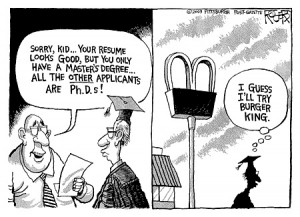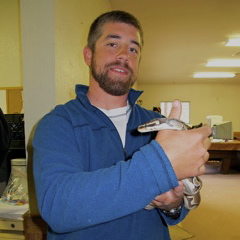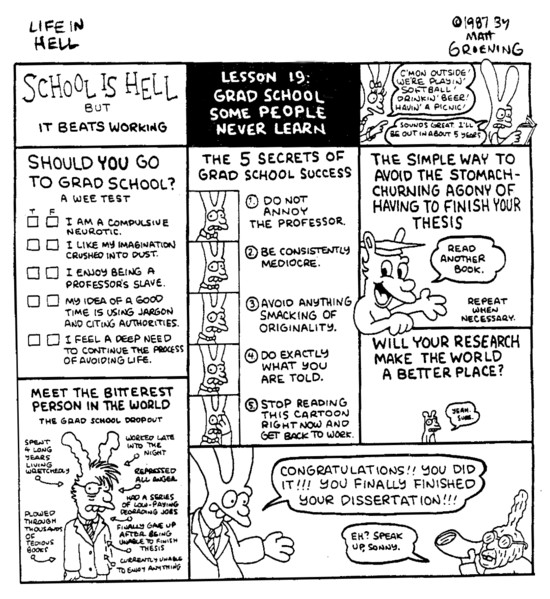A master’s degree is an advanced academic degree granted to individuals who have undergone study demonstrating a mastery or high-order overview of a specific field of study or area of professional practice.
 Earning a Master’s degree requires hard work, passion, and dedication. The financial obligation and time commitment needed for one to two years of intense study can take a toll on anyone. When thinking about making the commitment to applying for a Master’s program, one may feel they do not have any free time. Studying and going to class becomes an occupation; it is not college anymore. Not only do you have to go to three-hour long lectures and discussions, you have papers to write, books to read, and meetings for projects.
Earning a Master’s degree requires hard work, passion, and dedication. The financial obligation and time commitment needed for one to two years of intense study can take a toll on anyone. When thinking about making the commitment to applying for a Master’s program, one may feel they do not have any free time. Studying and going to class becomes an occupation; it is not college anymore. Not only do you have to go to three-hour long lectures and discussions, you have papers to write, books to read, and meetings for projects.
Let’s not forget about the other part of being a student; the human aspect. Running errands, cleaning your house, taking care of animals or children, visiting friends and family, and perhaps working full-time have to fit into a schedule that demands on point planning and multi-tasking. Even the online programs, of which there are hundreds, still take one to two years depending on the degree and school.
Is working towards a Master’s worth it? What does an expensive piece of paper do for you and your career?
 I want to answer these questions by telling you my story about how I received my Master’s and what I think it has done for me since June 2011. I went to University of North Carolina and received my bachelor’s in English. I wanted to teach high school English, but the programs offered at UNC require you to get a Master’s degree. Potential secondary teachers major in the subject they wish to teach and then apply for the Master’s of Arts in Teaching. Upon completion of the program, you receive your license to teach, as well as a year’s worth of top-notch education.
I want to answer these questions by telling you my story about how I received my Master’s and what I think it has done for me since June 2011. I went to University of North Carolina and received my bachelor’s in English. I wanted to teach high school English, but the programs offered at UNC require you to get a Master’s degree. Potential secondary teachers major in the subject they wish to teach and then apply for the Master’s of Arts in Teaching. Upon completion of the program, you receive your license to teach, as well as a year’s worth of top-notch education.
Throughout the program, I asked myself over and over again why I thought receiving a Master’s was going to be such an accomplishment and how the title of “Master’s” was going to benefit me in the long run. Here’s what I came up with:
- Frankly, higher education written on a resume sends the message to a potential employer or another school program that you can handle the rigor of higher-level coursework and workloads.
- You gain the necessary skills and background knowledge to back up any action you do or anything you say. I gained the confidence to be a part of discussions that stretch my mind and open up the doors for ideas that can be successful or flop.
- The hours I spent researching, having dialogues with professors and collaborating with my classmates (some my age, some who were turning gray) opened my eyes to the experiences that everyone has, in and out the field. I learned that many dialogues I have with others, especially adults, are the teachable moments that always keep me on my toes.
- The extra year of school is an extra year of training for the real world. I gained insight and knowledge from every lecture I attended, every book I read, and every conversation I had.
- The caliber of students, intensity of the coursework and the real-life experience prepared me for a life of teaching students of all ages.
- Did I mention that having a Master’s usually also gives you a higher salary than someone with just a bachelor’s? Think about it.
 Now, fast-forward one year. I am the medic at High Trails Outdoor Science School and teaching 5th and 6th grade science as well as staff inservices in the San Bernardino Mountains. How is a Master’s useful at a place like this? Teaching is my passion, and teaching adults well is a skill that I continue to develop each day that I am at work.
Now, fast-forward one year. I am the medic at High Trails Outdoor Science School and teaching 5th and 6th grade science as well as staff inservices in the San Bernardino Mountains. How is a Master’s useful at a place like this? Teaching is my passion, and teaching adults well is a skill that I continue to develop each day that I am at work.
The Master’s program I attended introduced me to a wide range of teaching strategies and foundational theories that allow me to be confident in front of any group of children or adults. So, was it worth it? Absolutely. I use what I learned from the program on a daily basis. I do my best to set the bar with high-caliber teaching.

At High Trails Outdoor Science School, we literally force our instructors to write about elementary outdoor education, teaching outside, learning outside, our dirty classroom (the forest…gosh), environmental science, outdoor science, and all other tree hugging student and kid loving things that keep us engaged, passionate, driven, loving our job, digging our life, and spreading the word to anyone whose attention we can hold for long enough to actually make it through reading this entire sentence. Whew…. www.dirtyclassroom.com

Comments are closed.